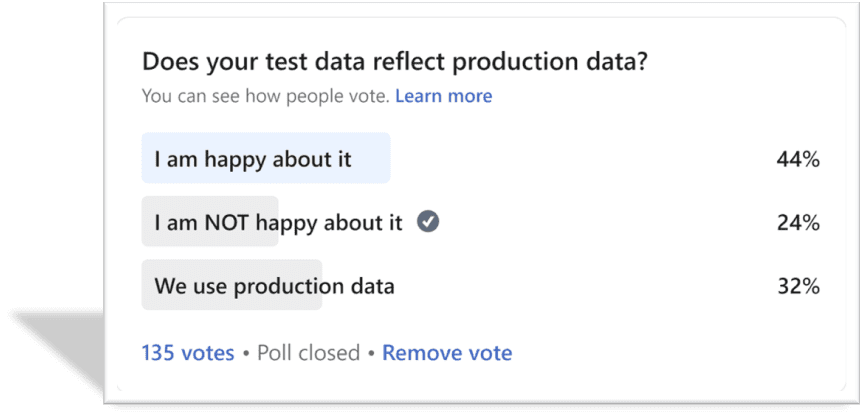The Future of Test Data Management: Why Synthetic Data is Your Competitive Edge
The video illustrates the results of the poll and explains how test data can reflect production data.
This video is captured from the Syntho webinar about why do organizations use synthetic data as test data?. Watch the full video here.

The poll results after asking if your test data reflects production data
Testing is an essential part of software development, and ensuring that your test data accurately reflects production data is critical to producing reliable results. However, this can be a challenging task, particularly when it comes to ensuring data privacy and security. Here, we’ll explore how you can ensure your test data reflects production data while balancing the need for accuracy with data privacy and security concerns.
One of the main challenges of reflecting production data in test data is ensuring that the test environment is identical to the production environment. Any differences in the environment can affect the accuracy of your tests, and therefore the reliability of your results. Additionally, ensuring data privacy and security can be difficult when working with production data.
One solution to these challenges is using synthetic data for testing. Synthetic data is artificially generated data that closely mimics the characteristics of production data. Using synthetic data allows testers to run tests repeatedly without the risk of data privacy and security breaches.
Balancing the need for accurate testing with data privacy and security concerns can be challenging. Using production data for testing can provide accurate results, but comes with significant privacy and security risks. On the other hand, using synthetic data eliminates privacy and security risks, but may not accurately reflect the real-world production data. Finding a balance between these two concerns is critical.
Choosing the right approach for your testing needs will depend on your specific situation. If data privacy and security are top concerns, using synthetic data is likely the best solution. If accuracy is essential, using production data may be necessary. It’s important to carefully consider the pros and cons of each approach and choose the one that best fits your testing needs.
In conclusion, ensuring that your test data reflects production data is critical to producing reliable test results. While using production data may provide the most accurate results, it comes with significant privacy and security risks. Synthetic data can provide a useful alternative, but may not accurately reflect real-world data. Choosing the right approach for your testing needs requires careful consideration of your specific situation and a balance between accuracy, privacy, and security concerns.

Contact Syntho and one of our experts will get in touch with you at the speed of light to explore the value of synthetic data!